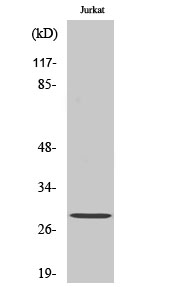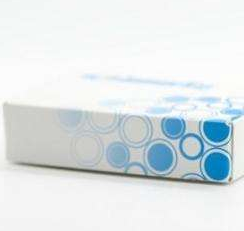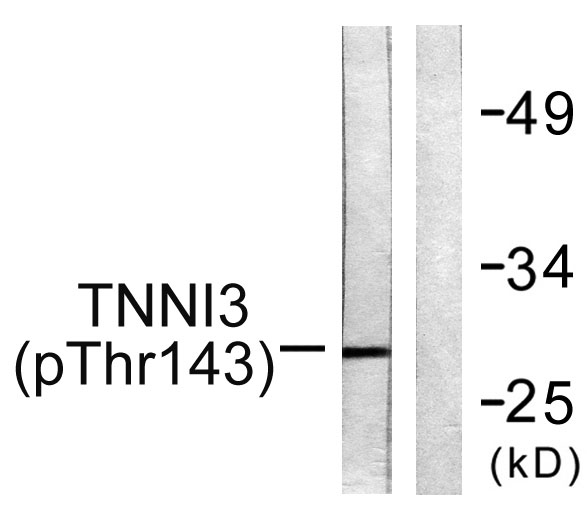Troponin I-C Polyclonal Antibody
- Catalog No.:YT4749
- Applications:WB;IHC;IF;ELISA
- Reactivity:Human;Mouse;Rat
- Target:
- Troponin I-C
- Fields:
- >>cAMP signaling pathway;>>Cardiac muscle contraction;>>Adrenergic signaling in cardiomyocytes;>>Hypertrophic cardiomyopathy;>>Dilated cardiomyopathy;>>Diabetic cardiomyopathy
- Gene Name:
- TNNI3
- Protein Name:
- Troponin I cardiac muscle
- Human Gene Id:
- 7137
- Human Swiss Prot No:
- P19429
- Mouse Gene Id:
- 21954
- Mouse Swiss Prot No:
- P48787
- Rat Gene Id:
- 29248
- Rat Swiss Prot No:
- P23693
- Immunogen:
- The antiserum was produced against synthesized peptide derived from human TNNI3. AA range:11-60
- Specificity:
- Troponin I-C Polyclonal Antibody detects endogenous levels of Troponin I-C protein.
- Formulation:
- Liquid in PBS containing 50% glycerol, 0.5% BSA and 0.02% sodium azide.
- Source:
- Polyclonal, Rabbit,IgG
- Dilution:
- WB 1:500 - 1:2000. IHC 1:100 - 1:300. ELISA: 1:5000.. IF 1:50-200
- Purification:
- The antibody was affinity-purified from rabbit antiserum by affinity-chromatography using epitope-specific immunogen.
- Concentration:
- 1 mg/ml
- Storage Stability:
- -15°C to -25°C/1 year(Do not lower than -25°C)
- Other Name:
- TNNI3;TNNC1;Troponin I; cardiac muscle;Cardiac troponin I
- Observed Band(KD):
- 26kD
- Background:
- Troponin I (TnI), along with troponin T (TnT) and troponin C (TnC), is one of 3 subunits that form the troponin complex of the thin filaments of striated muscle. TnI is the inhibitory subunit; blocking actin-myosin interactions and thereby mediating striated muscle relaxation. The TnI subfamily contains three genes: TnI-skeletal-fast-twitch, TnI-skeletal-slow-twitch, and TnI-cardiac. This gene encodes the TnI-cardiac protein and is exclusively expressed in cardiac muscle tissues. Mutations in this gene cause familial hypertrophic cardiomyopathy type 7 (CMH7) and familial restrictive cardiomyopathy (RCM). [provided by RefSeq, Jul 2008],
- Function:
- disease:Defects in TNNI3 are the cause of cardiomyopathy dilated type 2A (CMD2A) [MIM:611880]. Dilated cardiomyopathy is a disorder characterized by ventricular dilation and impaired systolic function, resulting in congestive heart failure and arrhythmia. Patients are at risk of premature death.,disease:Defects in TNNI3 are the cause of cardiomyopathy familial hypertrophic type 7 (CMH7) [MIM:191044]. Familial hypertrophic cardiomyopathy is a hereditary heart disorder characterized by ventricular hypertrophy, which is usually asymmetric and often involves the interventricular septum. The symptoms include dyspnea, syncope, collapse, palpitations, and chest pain. They can be readily provoked by exercise. The disorder has inter- and intrafamilial variability ranging from benign to malignant forms with high risk of cardiac failure and sudden cardiac death.,disease:Defects in TNNI3 are the cau
- Subcellular Location:
- cytosol,troponin complex,sarcomere,
- Expression:
- Heart,Heart muscle,PCR rescued clones,
The use of antibody modified liposomes loaded with AMO-1 to deliver oligonucleotides to ischemic myocardium for arrhythmia therapy. BIOMATERIALS Biomaterials. 2014 Apr;35:3697 IHC Rat 1:100 left ventricle
- June 19-2018
- WESTERN IMMUNOBLOTTING PROTOCOL
- June 19-2018
- IMMUNOHISTOCHEMISTRY-PARAFFIN PROTOCOL
- June 19-2018
- IMMUNOFLUORESCENCE PROTOCOL
- September 08-2020
- FLOW-CYTOMEYRT-PROTOCOL
- May 20-2022
- Cell-Based ELISA│解您多样本WB检测之困扰
- July 13-2018
- CELL-BASED-ELISA-PROTOCOL-FOR-ACETYL-PROTEIN
- July 13-2018
- CELL-BASED-ELISA-PROTOCOL-FOR-PHOSPHO-PROTEIN
- July 13-2018
- Antibody-FAQs
- Products Images

- Western Blot analysis of various cells using Troponin I-C Polyclonal Antibody. Secondary antibody(catalog#:RS0002) was diluted at 1:20000

- Immunohistochemistry analysis of paraffin-embedded human heart tissue, using TNNI3 Antibody. The picture on the right is blocked with the synthesized peptide.

- Western blot analysis of lysates from Jurkat cells, using TNNI3 Antibody. The lane on the right is blocked with the synthesized peptide.

